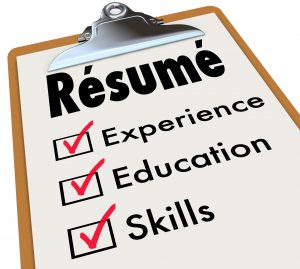WHY FIRST IMPRESSIONS MATTER
Many graduations are taking place now. If you have secured summer employment, congratulations! If you are looking for an internship, full or part time position, there are some important things to keep in mind. Ask yourself this question – what kind of first impression are you giving employers – either on paper or in person? Especially now when you are looking for a job, you want to convey how professional you are at all times. Remember this – you never get a second chance to give a first impression so it is important for you to understand why first impressions matter.
YOUR RESUME – WHAT DOES IT SAY ABOUT YOU?
If you are sending your resume out to several employers who have never met you before, first impressions definitely matter.The person receiving your resume doesn’t know your personality or demeanor. At this point, you are only a resume they see on a piece of paper or on a computer screen. Period.
Do you know recruiters only glance at a resume for an average of six seconds? That is known as being “glanceable”. Think about that – you only have a few seconds to be put in the “GO PILE” or the “NO PILE“. If you are put in the GO PILE – that’s awesome because you are moving ahead to the next step of the process. You may be called for a telephone or face-to-face interview. If you are put in the NO PILE, employers may never contact you. If you are not being contacted, it’s time to take a deep-dive thorough look at your resume.
RESUME RULES DIFFER BY COUNTRY
Let me first start by saying rules around resumes differ by country. Where ever you are seeking employment, you will need to do your homework to establish what that country’s rules are around resumes prior to sending it out. One example is whether to include a photo of yourself on your resume. There are some countries that encourage a photo on resumes while others do not. If seeking employment in the U.S., it is not a good idea to include a photo. The most important aspect of your resume is the content which includes keywords and accomplishments rather than what you look like.
No matter where in the world you are seeking employment, make sure your resume conveys what value you can bring to the employer.
One major thing to remember is NEVER EMBELLISH achievements or qualifications on your resume. Being honest on your resume is highly important – no matter where in the world you apply. In some countries, dishonesty is punishable by law! I can’t stress it enough – do your research!

Here, in the U.S., there are some rules of thumb to follow. Therefore, make sure your resume is top notch by keeping these aspects in mind:
> NO spelling or grammatical errors – not even ONE
Have someone review your resume before sending it out to employers. Have a family member, best friend, instructor or Career Services adviser review it. Don’t rely on spell check catching everything. It may not catch when you meant “there” but instead typed “their”.
> One page
Brevity is key when it comes to resumes. If your resume is long, it becomes less glanceable within those few seconds mentioned earlier. Especially at this point of your life, your resume should be one page.
> Use a professional email address
Be very aware of your email address included on your resume when sending it out to employers. There are enough free email sites that you can simply use your name as an email address. Using an email address similar to “hotmama3212@yahoo.com” would not be considered a professional email address.
> Bullet points vs. paragraphs
When describing your duties, using bullet points and short sentences is much easier to read than long paragraphs.
> Watch your tenses
When constructing your resume, watch your verb tenses and keep them consistent throughout the resume. If your jobs are in the past, make your verb tenses in the past. If you are currently on the job, make your verb tenses in the present.
> Chronological order
Your resume is much easier to read and understand if put in chronological order with most recent jobs and accomplishments on top.
> Sending format
When submitting your resume, send it as a PDF file. This ensures the receiver sees your information in the correct format.
> Quantify your successes
When explaining your successes, use numbers and percentages whenever possible. For example, instead of saying “I increased our department’s sales last quarter”, state “I increased our department’s sales by 20% in 2017.”
> References
There is no need to include references on your resume. There was a time, people would include a sentence at the bottom of the resume “References Available Upon Request”. That is not even necessary. If an employer wants to contact your references, you will be contacted. At that point, I am sure you will be happy to provide that information to them. Am I right?
 THE CELL PHONE MESSAGE….BE AWARE!
THE CELL PHONE MESSAGE….BE AWARE!
If you’ve been looking for a job, chances are you have applied and used your cell phone as a contact number. One important thing to keep is mind is your cell phone message. Is it blasting music? Are you screaming a message at the top of your lungs? If you have chosen either one of those options, please change your message – immediately.
When an employer calls, you want to show how professional you are. Many times, a hiring manager is not going to sit through several minutes of music or other non professional voice messages. Either use the default voice mail or something as simple as “Hello. You’ve reached <your name>. I’m not available right now to take your call, but please leave your name, number and message and I’ll return your call as soon as possible.” That’s it.
COVER LETTER TIPS
When it comes to cover letters, there may be different trains of thought. Some employers find them to be very helpful in learning about the potential candidate. Some employers may not find them to be as helpful. I would suggest you have a cover letter in your documents area so if asked for one, you can quickly edit as needed and provide it if requested.
>NO spelling or grammatical errors – not even ONE
Sound familiar? Just as there should be no spelling or grammatical errors on your resume, the same rule applies for cover letters.
> Make it easy to read
Remember when I discussed your resume should be “glanceable”? Your cover letter should be as well. It should not be a lengthy document that rambles on forever. Instead, make it easy to read – six second rule here. Use some of those power words as stated in the job description to describe the work you have accomplished.
> Address it to the proper person
Before sending your cover letter out to employers, do your research. Try your best to address the letter to the hiring manager of the position. When using the hiring manager’s name, make sure it is spelled correctly. If you don’t have a name, addressing it to “Dear Hiring Manager” is much better than “To Whom It May Concern” because it is more personable.

> Do a skills check
Before applying for a position, ask yourself this question – do your skills fit the job description? You need to assess that so when you’re constructing the letter, you can use those key words used in the job description to describe your background. Those are the skills employers are searching for, so you want to convey that you fit the skills being sought.
FINAL THOUGHTS
Making a good first impression is very important when seeking employment. Make sure your resume and cover letters stand out by making sure they don’t have any spelling or grammatical errors. Even one error can make a difference. Make sure your email address is professional and you have a professional voicemail message on your cell phone. Reflect professionalism at all times.
I like to hear from visitors. Was this article helpful to you?
![]()


8 thoughts on “Why First Impressions Matter”
I wish more students understood the email and voicemail messages! There have been a few times I have helped students and at the top of their resume is a rather unprofessional email address. It is interesting to see what some see as a professional email versus others.
Thanks for the comments, Julie. I have seen the same things on resumes. I feel some times people create email addresses for humor and then decide to use those same email addresses for employment purposes without realizing the possible impact it makes on their chances of employment. I applaud you for helping students in their career endeavors. Keep up the great work.
As a recent graduate, this article was very helpful! Wow! I can’t believe that employers only take three to six seconds to glance at your resume. I will definitely use this advice to improve my resume and cover letter.
Sakeenah, thank you for visiting my website and for your comments. I am so glad you found this information helpful and will improve your resume and cover letter. Please contact me for any assistance you may need. I wish you all the best with your career endeavors. Please come back and visit again soon.
This blog is on point!
I have applied for roles with just a resume and then I have applied for some positions with both a resume AND cover letter. I can attest to there being a dramatic difference in the amount of call backs/interview invitations I have received when I use both. Catering your resume and cover letter specifically to role and company/organization you’re applying for show them employer that you take initiative and have done your research. Sometimes a little effort goes a long way.
This blog makes me feel a little more at ease in knowing that I am marketing myself in the most professional way for me. Having a professional voicemail message, online social media profiles may also help you go from the “No Pile” to the “Go Pile”.
Rachael, thank you so much for visiting my site and for the comments. Thank you very much for sharing your personal experience about the response from employers when you go the extra mile. It does make a difference and what you have described in your experience proves that. Being professional at all times with how you portray yourself – whether on paper or in social media – can make a huge difference. Getting into that “go pile” is the goal. Once again, thank you for sharing your experience with my visitors. I wish you all the best. Please visit my site again soon.
Hi,
You have some great pointers here. One for sure is the email address. One I had to let my son know about to change his email from an email he uses for friends and another he will use as a business persona.
I think a lot of teens may forget these simple things. You have given out some good guide lines. As you can imagine most teens may forget some of these things. This is a fabulous article and one I shall with my Children’s friends too. Who are all embarking out on their first Jobs.
Some great and very useful tips and also very important tips too you have added here in your Article.
Looking forward to reading more of your blog in the future.
Regards Deborah
Deborah, thank you for visiting my site and for all the kind words. Like you, I do realize those seeking jobs make forget these simple things and not even be aware they are even considered by employers. It’s very easy to overlook these aspects. I am glad you reminded your son about the email address because it does matter. Thank you very much for sharing this information to others you know. Spreading the word is a great advantage to all our youth as they are trying to prepare for their future. Please visit my site again very soon.